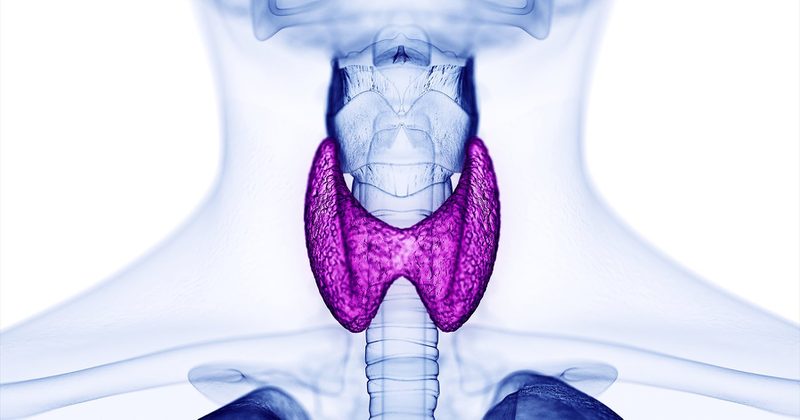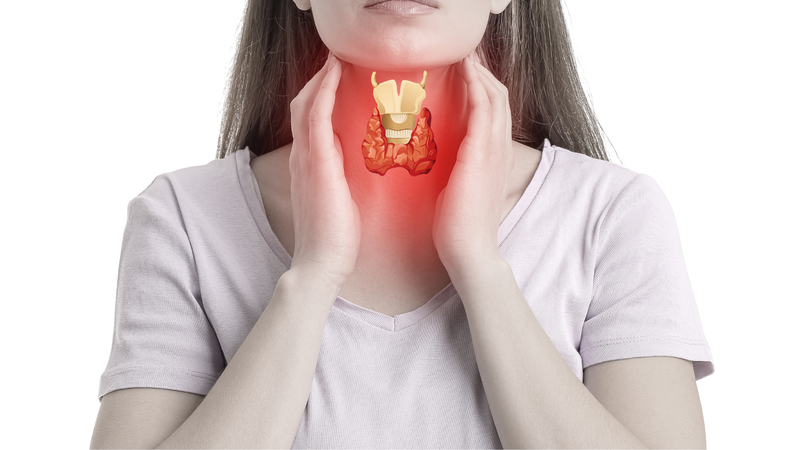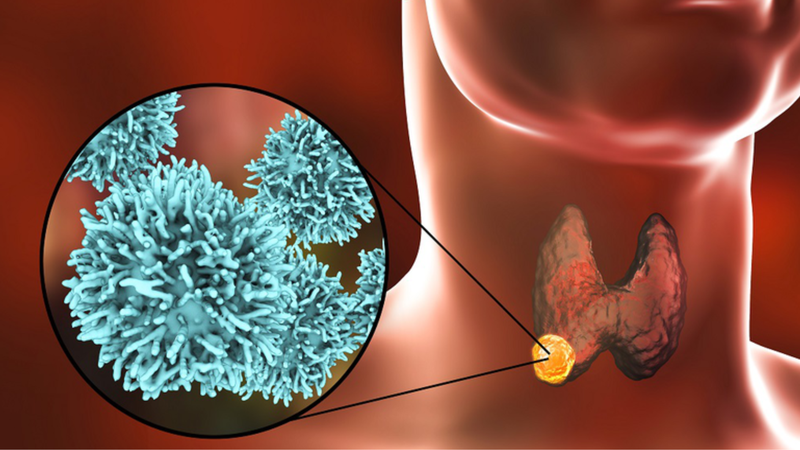Thyroid disease affects the ability to produce hormones needed by the body. On the other hand, it is also related to genetic factors, so it can last a long time. Therefore, in the article below, we will send you information about common thyroid diseases so that you can detect them early and have appropriate treatment measures.
What is thyroid disease?
The thyroid is a small organ located in the front of the neck. It is shaped like a butterfly, smaller in the middle with two wide wings surrounding one side of your throat.
The thyroid gland controls your metabolism with a number of specific hormones: T4 (thyroxine, containing four iodide atoms) and T3 (triiodothyronine, containing three iodide atoms). These two hormones produced by the thyroid gland control processes in the body such as: Metabolic rate, cardiovascular, energy, mood, fertility. When your thyroid is functioning properly, it maintains the right amount of hormones to keep your metabolism running at the right level.

The thyroid is a small organ located in the neck.
The pituitary gland is located in the center of your skull, below your brain, and it monitors and controls the amount of thyroid hormone in your blood. When the pituitary gland senses a lack of thyroid hormone or high levels of thyroid hormone in your body, it adjusts its own hormone levels. The hormone TSH in the pituitary gland sends a signal to the thyroid gland, which tells it what to do to get your body back to normal.
Thyroid disease is a general term for a medical condition that causes your thyroid gland to not produce enough or too much of the hormones your body needs. Understanding thyroid disease can help you detect and treat it early.
Common types of thyroid disease
Some common types of thyroid disease include:
Hypothyroidism
When the thyroid gland is underactive and does not secrete enough thyroxine hormone, hypothyroidism occurs. When your body doesn’t get enough hormones, you may experience a number of symptoms, including:
- Unexplained weight gain or difficulty losing weight;
- Fatigue and weakness;
- Coldness, especially in the hands and feet;
- Dry and cracked skin;
- Increased feelings of sadness and nervousness;
- Feeling sluggish and lethargic;
- Menstrual irregularities in women;
- High blood cholesterol;
- Swelling of the eyes and face, which can lead to Graves’ disease (a Hashimoto’s trait).
Some causes of hypothyroidism include:
- Hashimoto’s thyroiditis: This is the most common autoimmune condition that causes hypothyroidism. In Hashimoto’s disease, the body’s immune system attacks and destroys thyroid cells.
- Thyroid surgery: Thyroid surgery may be performed to remove a thyroid tumor, goiter, or other thyroid problems.
- Radiation: Radiation to the neck or chest can damage the thyroid gland and lead to hypothyroidism.
- Medications: Certain medications, such as lithium and amiodarone, can reduce thyroid hormone production.
- Iodine deficiency: Iodine is a nutrient needed for thyroid hormone production.
Diagnosis of hypothyroidism is usually made with a blood test to measure thyroid hormone levels. If thyroid hormone levels are low, your doctor may recommend treatment with thyroid hormone replacement medications. Thyroid hormone replacement medications help supplement the thyroid hormone that the body does not produce enough of on its own.
Depending on the medical condition, your doctor will have different treatment options. Treatment of hypothyroidism is effective in improving symptoms. If not treated promptly, it will lead to serious complications such as: Heart failure, stroke, thyroid cancer.

Hypothyroidism is one of the common thyroid diseases.
Hyperthyroidism
Hyperthyroidism is when the thyroid gland makes too much of the hormones triiodothyronine and thyroxine. Hyperthyroidism is more common in women than in men. Causes of hyperthyroidism can include:
- Graves’ disease: Graves’ disease is an autoimmune disease in which the body’s immune system attacks the thyroid gland and causes it to produce too much thyroid hormone.
- Adenoma: A benign thyroid tumor can lead to overproduction of thyroid hormone.
- Malignant thyroid tumor (thyroid cancer): Some types of thyroid cancer cause overproduction of thyroid hormone.
- Radiation to the neck or chest: Can damage the thyroid gland and lead to hyperthyroidism.
- Medications: Certain medications, such as lithium and amiodarone, can increase thyroid hormone production.
Symptoms of hyperthyroidism can vary depending on the severity of the condition. Some typical symptoms include:
- Unexplained weight loss;
- Increased heart rate and irregular heartbeat;
- Anxiety, nervousness, agitation;
- Fatigue, weakness;
- Increased energy expenditure;
- Excessive sweating;
- Increased feeling of heat;
- Decreased muscle mass;
- Nausea and vomiting.
Diagnosis of hyperthyroidism is usually made with a blood test to measure thyroid hormone levels. If thyroid hormone levels are high, your doctor may recommend imaging tests, such as a thyroid ultrasound, to determine the cause of hyperthyroidism.
Treatment of hyperthyroidism depends on the cause and severity of the condition. Treatment may include:
- Antithyroid medications: Antithyroid medications help reduce the production of thyroid hormones.
- Radioactive iodine: Radioactive iodine is used to destroy thyroid cells that produce too much thyroid hormone.
- Thyroid surgery: Thyroid surgery is used to remove all or part of the thyroid gland.
If hyperthyroidism is not treated promptly, it will cause complications such as: heart failure, stroke, schizophrenia, thyroid cancer.

Hyperthyroidism is more common in women than in men.
Thyroid tumors
Thyroid tumors can be classified into two main types:
- Benign thyroid tumors: This is the most common type, accounting for about 95% of thyroid tumors and usually does not cause any dangerous symptoms.
- Malignant thyroid tumors: This is a rare type of tumor, accounting for about 5% of thyroid tumors.
The cause of thyroid tumors is still unknown, but may be related to a number of factors, including:
- Iodine deficiency: Iodine is an essential nutrient for the production of thyroid hormones. Adequate iodine intake is necessary to prevent thyroid disease.
- Genetic factors: Some types of thyroid tumors, such as benign papillary thyroid tumors, can run in families.
- Radiation: Radiation to the neck or chest can increase the risk of thyroid tumors.
- Age: Thyroid tumors are more common in older people.
Symptoms of thyroid tumors can vary depending on the type of tumor and the severity of the condition. Benign thyroid tumors are often asymptomatic, while malignant thyroid tumors have typical manifestations such as:
- Neck pain;
- Difficulty swallowing;
- Hoarse voice;
- Weight loss;
- Swollen lymph nodes in the neck.
Diagnosis of thyroid tumors is usually done with a blood test to measure thyroid hormone levels. If thyroid hormone levels are normal, your doctor may recommend imaging tests to determine the size and location of the tumor.
Treatment of thyroid tumors depends on the type of tumor and the severity of the condition. However, your doctor may recommend periodic monitoring to ensure that the tumor does not grow or become malignant. For malignant tumors, surgery is required to remove them. After surgery, the patient may need to be treated with radioactive iodine or anti-cancer drugs.
If thyroid tumors are not detected and treated properly, they can cause dangerous complications. In some cases, benign thyroid tumors can grow large and press on surrounding organs, such as the trachea or esophagus. With malignant thyroid tumors, cancer cells can spread to other organs in the body, such as the liver, lungs, or bones, and can be fatal.

Malignant thyroid tumors require immediate treatment.
Thyroid Cancer
Thyroid cancer can be classified into two main types:
- Differentiated thyroid cancer: This is the most common type, accounting for about 90% of thyroid cancers. Differentiated thyroid cancer develops from normal thyroid cells.
- Anaplastic thyroid cancer: This is a rare type of cancer, accounting for about 10% of thyroid cancers. Anaplastic thyroid cancer develops from thyroid cells that have undergone significant changes.
The exact cause of thyroid cancer is unknown, but it may be related to a number of factors, including: iodine deficiency, genetic factors, radiation, or age.
The symptoms of thyroid cancer can vary depending on the type of tumor and how severe the condition is. Anaplastic thyroid cancer often does not cause any symptoms in its early stages. Anaplastic thyroid cancer can cause symptoms such as: Neck pain, difficulty swallowing, hoarseness, swollen lymph nodes in the neck.
Thyroid cancer is usually diagnosed with a blood test to measure thyroid hormone levels. If thyroid hormone levels are normal, your doctor may recommend imaging tests to determine the size and location of the tumor.
Thyroid cancer treatment depends on the type of tumor and how severe it is. Anaplastic thyroid cancer can be treated with surgery, radioactive iodine, or anti-cancer drugs. Anaplastic thyroid cancer usually requires surgery and chemotherapy. If not treated early, thyroid cancer cells can spread to other organs in the body such as the liver, lungs, or bones.

There are many causes of thyroid cancer.
Measures to prevent thyroid diseases
Thyroid diseases in general weaken the patient’s health. Therefore, below we will share with you measures that can prevent these diseases:
- Follow a healthy diet: A healthy diet provides enough iodine, selenium and other nutrients necessary for thyroid health.
- Control weight: Being overweight or obese can increase the risk of thyroid diseases, such as hyperthyroidism and hypothyroidism.
- Limit exposure to radiation: Exposure to radiation can increase the risk of thyroid cancer.
- Vaccination: Rubella vaccination can help prevent Hashimoto’s disease, a form of autoimmune thyroiditis.
- Screening: Screening for thyroid diseases can help detect and treat these diseases early.
The above is a sharing about the types of thyroid diseases that can be contracted. If you have signs of thyroid disease as above, you should consult your doctor for examination and accurate diagnosis. You should monitor periodically and adjust your lifestyle to ensure that hormone levels are maintained at a stable level in the body.





